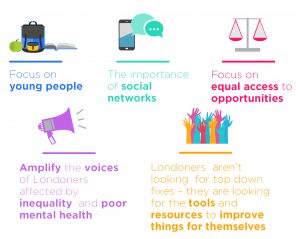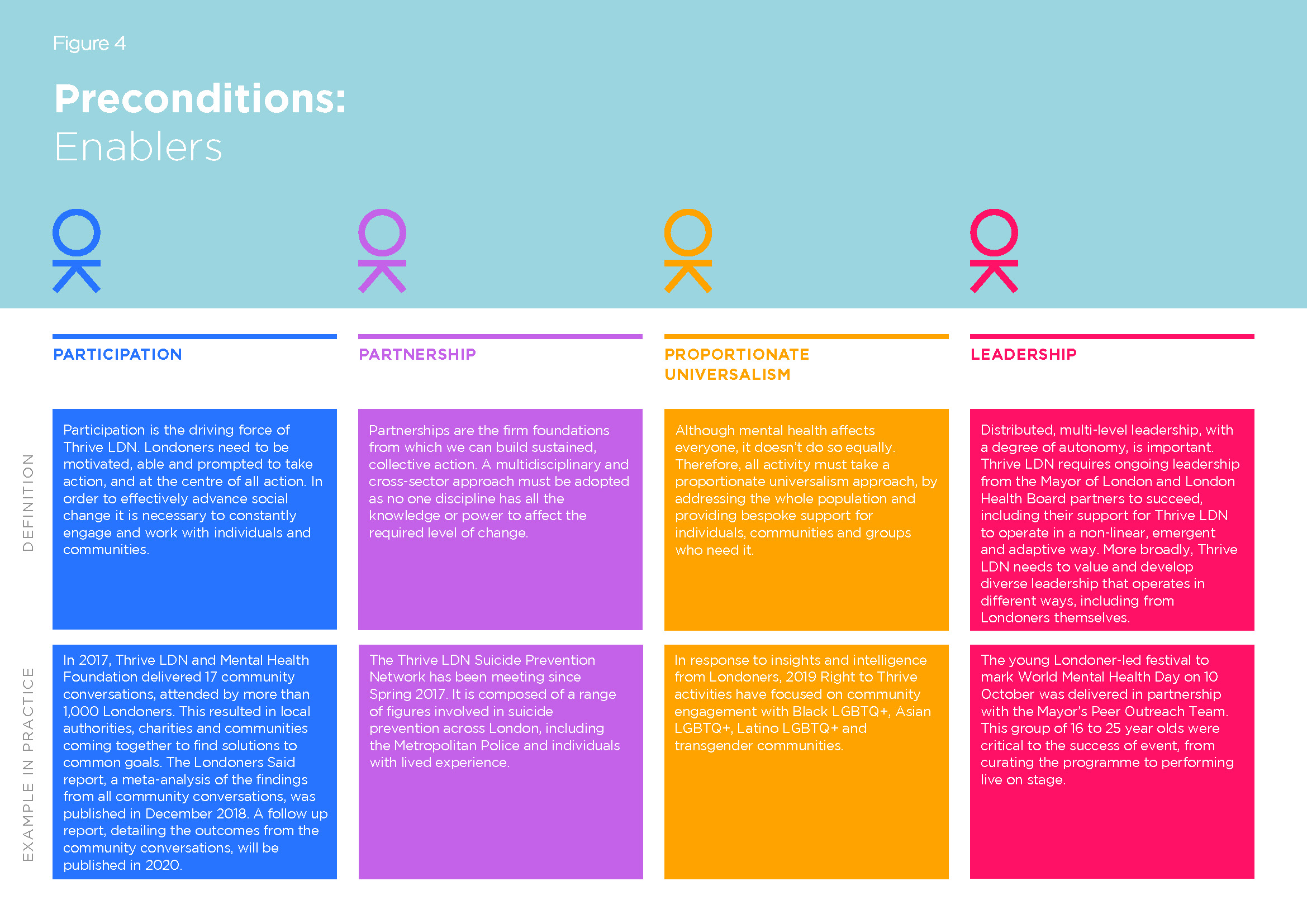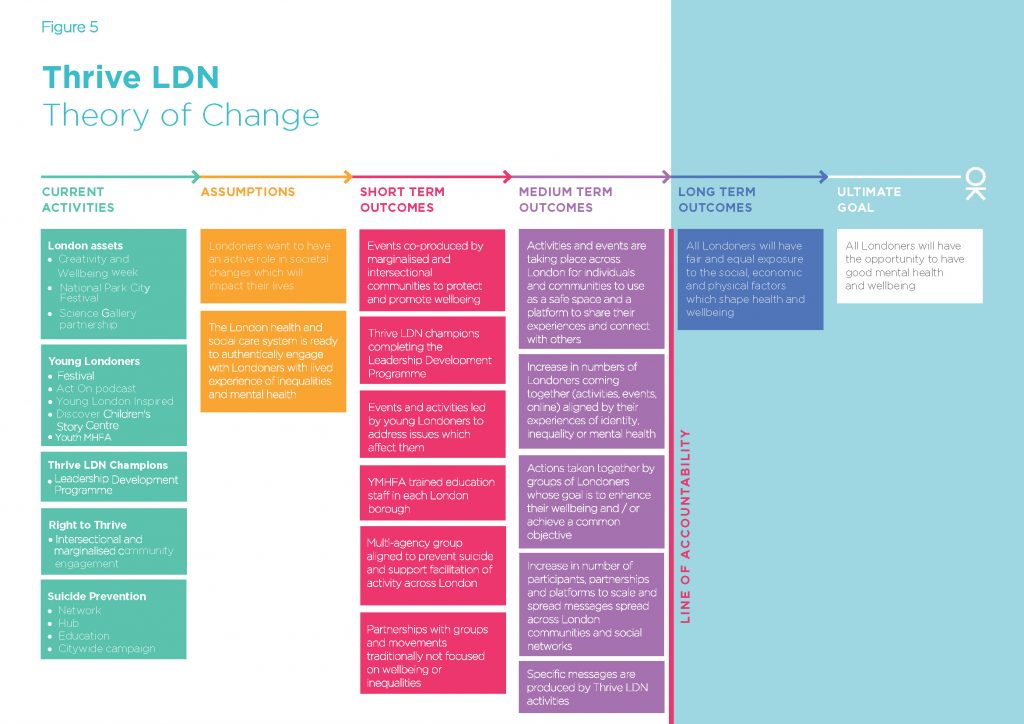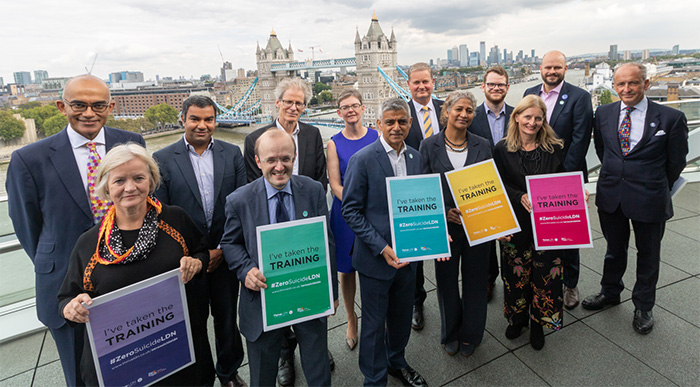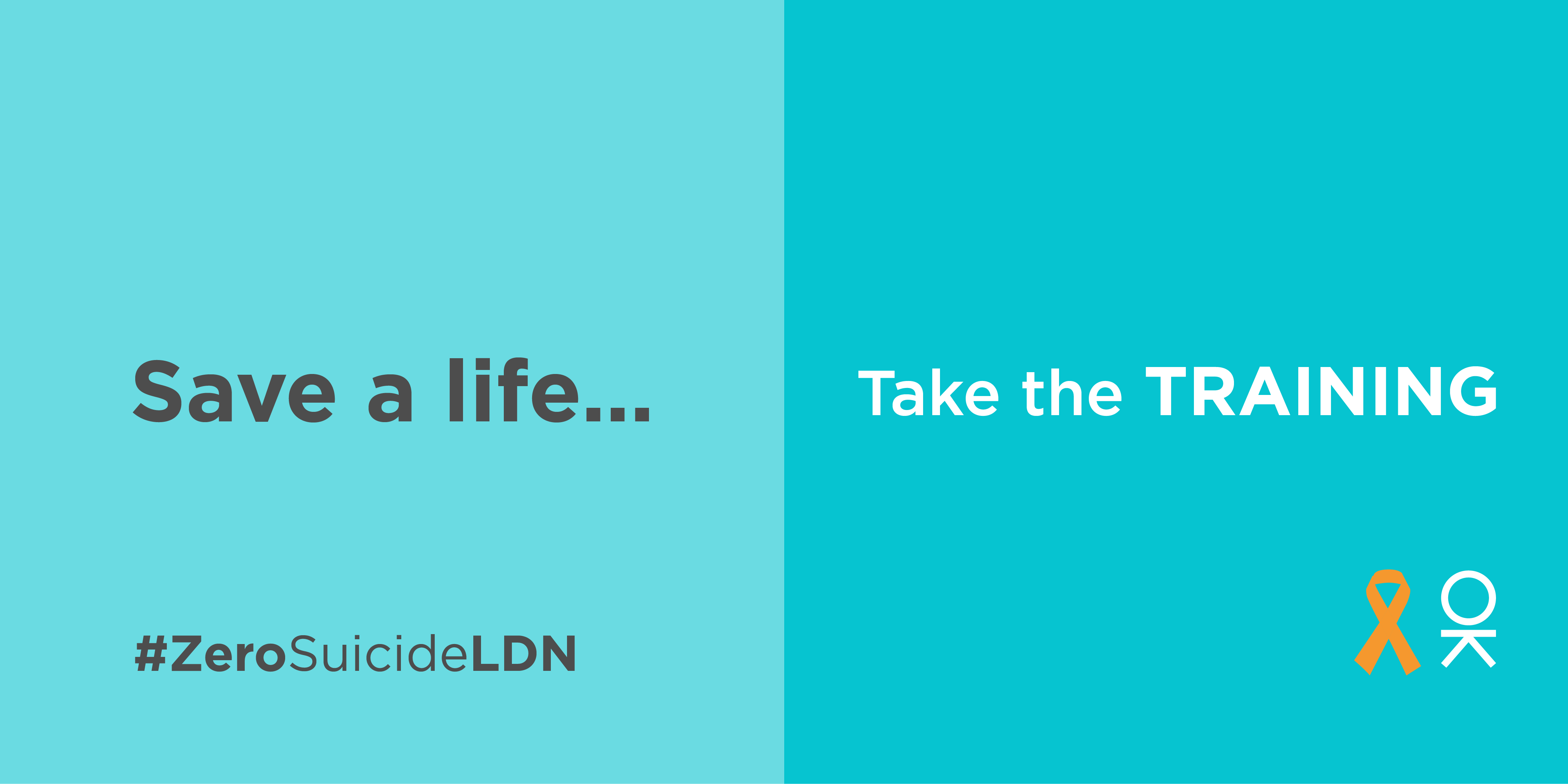
Thrive LDN Impact Report 2019/20 (April – Dec 2019)
Thrive LDN's interim Insights Report for activities between April and December 2019, alongside an indication of the next five years.
Thrive LDN's interim Insights Report for activities between April and December 2019, alongside an indication of the next five years.
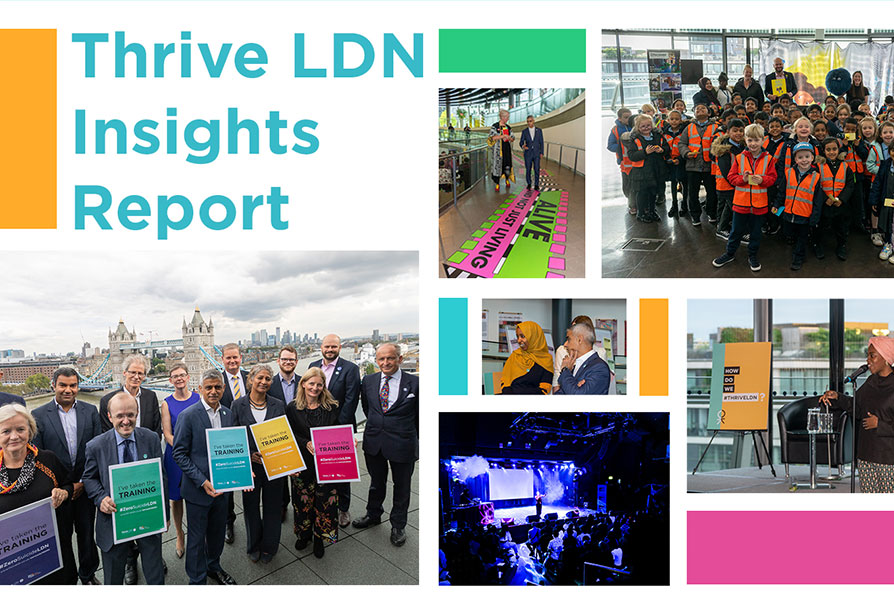
This interim report provides a brief overview of the history of Thrive LDN, our approach and Theory of Change, insights and feedback from activities between April and December 2019, and gives an indication of the next five years.
Forewords
Becoming a city where everyone has an equal opportunity to thrive
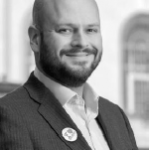
Mayor Philip Glanville. Mayor of Hackney; Co-Lead, Thrive LDN
Like many major cities, London offers a wealth of opportunities for people to lead healthy and happy lives. At the same time, living and working here presents various challenges and issues which can impact our mental health and wellbeing.
Two million Londoners experience some form of poor mental health every year. One in six adults experienced a common mental health problem in the last week. Suicide is the leading cause of death for people between the ages of 10 and 34. These are shocking and sad statistics which will not improve unless we continue to stand together and look out for each other.
When people aren’t given the chance to fulfil their potential and they don’t receive the right support at the right time, their health suffers and they struggle to thrive. When this happens, London loses out. For example, we know that Londoners on the lowest incomes face fewer opportunities and experience the most inequalities.
In July 2017, the Mayor of London launched Thrive LDN as a citywide movement to improve the mental health and wellbeing of all Londoners. As a participation-driven partnership between the Mayor of London, the NHS, Public Health England and London Councils, we are working to create a healthier, fairer city, where nobody’s mental health and wellbeing suffers because of who they are or where they live.
This interim report highlights Thrive LDN’s progress to date through the development of meaningful relationships and interventions at a London, multi-borough and community or local level. It is testament to the hard work and dedication of young Londoners, our wider communities, volunteers, charities, London’s police and emergency services, health and care leaders and professionals.
The outcomes presented in this report also highlight the positive difference health and care leaders are making by sharing resources and collectively funding a programme of citywide and local activities to improve the mental health and wellbeing of all Londoners.
Partnership working has never been more important, particularly at a time when resources are more stretched than ever, and I’m incredibly grateful to everyone prepared to rise to and support the challenge.
I’m proud to work alongside fellow Londoners and colleagues to build momentum to improve the mental health and wellbeing of Londoners. To deliver lasting change, we need to continue to focus on solutions to help London become a city where everyone has an equal chance to a healthy, happy and fulfilling life.
Responding to the needs and insights of Londoners

Dr Jacqui Dyer MBE. Mental Health Equalities Champion for NHS England; Thrive LDN Co-Lead
When the Mayor of London launched the Thrive LDN movement in July 2017, it set in motion work to engage with and respond to the needs and insights of Londoners. Partners involved at the outset knew that we could achieve so much more by working together. I have since been overwhelmed by the response, willingness and involvement of Londoners to create positive change in their communities. Thriving Cities all over the world are embracing the mission to co-create thriving diverse and inclusive communities.
We must recognise that with challenges and barriers comes aspiration, passion and huge, important contributions to London. Communities across London are full of amazing people and we need to celebrate the work they’re doing to support themselves and to build resilience to the challenges they face.
Through leading and taking part in Thrive LDN’s activities and campaigns, we know that Londoners aren’t looking for top-down fixes – instead, they want the tools, resources and opportunities to improve things for themselves. In fact, when we asked more than 1,000 Londoners from right across the city how they can help their community to thrive, their solutions often shared a common theme. Namely, to spread knowledge, skills and support so that people can better look after themselves and their neighbours. They are not looking for institutions or systems to apply quick fixes, they want the power and means to develop lasting improvements themselves.
Thrive LDN’s community-led activities, partnerships and campaigns provide the collective action that is needed to support local neighbourhoods, groups and individuals to develop strength and resilience. Outlined in this interim report is an overview of this work and our collective achievements since launching, with an important look towards future ambitions for our shared movement.
We’ve only just begun. At a time when young Londoners in particular are facing negativity and challenges, we should pause, recognise and celebrate the leadership they have shown through Thrive LDN initiatives. We need to maintain an open conversation with Londoners to encourage everyone to think, talk and act more when it comes to mental wellbeing for them and their communities. Getting this right is crucial for our aim to support many more communities to lead healthier, happier lives.
A consistent citywide approach to reach all Londoners

Paul Najsarek. Chief Executive, The London Borough of Ealing; Chair, Thrive LDN Advisory Group
Improving the health and happiness of residents is something that every London borough is working hard to achieve. As the chief executive of one of London’s 32 local authorities, I understand the difficulty with balancing support and resources between local and regional initiatives. Yet, I firmly believe that for all Londoners to thrive there needs to be capacity for both.
Poor mental health remains one of the biggest challenges facing London and it is often much higher in certain communities, such as those living in poverty and those in some minority groups, but it impacts everyone living, working and studying here. It is a complex challenge that is best tackled through collective action across London and through place-based activities that respond to the uniqueness of boroughs.
This interim report provides insights and feedback from the work undertaken by Thrive LDN and partners to bring together residents, mental health service providers, commissioners, charities and businesses around how we can provide a sense of purpose and fulfilment for all Londoners. It highlights the need for consistent citywide approaches that augment and complement local plans.
Doing so will help us reach all Londoners, building stronger, more connected communities who are better able to build resilience by talking openly about mental health.
There has been strong leadership in supporting this citywide movement to improving everyone’s mental health and wellbeing. It is through the numerous citywide projects and activities outlined in this report that we are seeing sustained outreach, engagement and direct involvement with Londoners. All of which is positively enhancing and building on the commitments to mental health and wellbeing in local areas.
More than half the world’s population live in cities and by 2050 this is estimated to increase to two thirds. The health of our cities has never been more important. Whilst there is much more for us to achieve, Thrive LDN’s citywide participation-driven approach provides the foundations for us to make even bigger strides in tackling the most complex health issues affecting all our residents. I look forward to continuing to work with all partners and Londoners to improve lives.
Executive summary
Poor mental health is one of the biggest challenges facing London and prevalence is often much higher in the communities facing most inequalities.
In July 2017, the Mayor of London, alongside health and care partners, launched Thrive LDN with the aim of creating the collective action needed across London, for everyone to speak openly about mental health and have an equal opportunity to thrive. Following this, in September 2018, the Mayor further demonstrated his commitment to improving the mental health of Londoners through the publication of his Health Inequalities Strategy, which Thrive LDN supports the delivery of.
At its core, Thrive LDN is a participation-driven partnership that engages with and responds to the needs and insights of Londoners. By working in partnership across London we are better able to achieve our shared goal for all Londoners to have an equal chance to a healthy, happy and fulfilling life.
We begin this interim report with a snapshot of mental health in London from two perspectives: firstly, acknowledging some of the challenges London needs to address to ensure everyone has an equal opportunity to good mental health and secondly, highlighting some of the assets and protective factors London has which support good mental health.
Section 2 details our approach and Theory of Change, setting out Thrive LDN’s ultimate goal of ensuring all Londoners have the opportunity to have good mental health and wellbeing. Without the active participation of Londoners, partnership working and leadership at all levels, it would not be possible to deliver high quality Thrive LDN activities, or reach our short- or medium-term outcomes which we are measuring progress against, which include:
- Activities and events taking place across London for individuals and communities to use as a safe space and platform to share their experiences and connect with others.
- Increasing the numbers of Londoners coming together, aligned by their experiences of identity, inequality or mental health.
- Actions taken together by groups of Londoners whose goal is to enhance their wellbeing and/ or achieve a common objective.
- Increasing the number of participants, partnerships and platforms to scale and spread messages across London communities and social networks.
Londoners’ insights and feedback
Since conception, insights and feedback from Londoners have been at the core of everything we do. Last year, we held a co-creation sprint with more than 40 London grassroot groups, activists, champions, academics and charities to also understand participants’ views of Thrive LDN.
Across all our engagement and participatory work, there have been five emerging and common themes – all of which have guided and informed our work this year:
Main headlines for 2019/20 so far
Section 3 details outcomes and benefits from Thrive LDN activities between April and December 2019, including:
- More than 200,000 people have taken part in events and activities which Thrive LDN has led or collaborated on.
- More than 450 people attended a Young Londoner-led World Mental Health Day Festival with over 90% rating the festival as ‘good’.
- The Young London Inspired grants scheme has awarded 32 grants in total to voluntary and community organisations to create volunteering and social action opportunities for young Londoners at greater risk of poor mental health. An evaluation of projects in Year 1 has been completed, with 63% of young people reporting improved wellbeing.
- So far, our Youth Mental Health First Aid programme, has trained 101 new Youth MHFA Instructors and delivered Youth MHFA training to more than 1,300 education staff. The programme has delivered training in every London borough.
- Between May and November 2019, a cohort of more than 40 Thrive LDN Champions were enrolled in a Leadership Development Programme. Champions; they reported increased confidence following the training and have increased the number of locally owned and led Thrive LDN projects.
- As part of Right to Thrive, more than 1,200 people participated in film-based outreach and events for Londoners from intersectional and marginalised communities.
- The Thrive LDN Suicide Prevention Group is now composed of 36 organisations and 48 members who are facilitating a range of citywide projects, including the Thrive LDN Suicide Prevention Information Sharing Hub.
- The citywide #ZeroSuicideLDN campaign has seen more than 35,000 Londoners take the Zero Suicide Alliance’s free, online suicide prevention training.
- Supporting the growth of the ‘This is Me – In the City’ campaign, seeing over 37,000 employees helping to change attitudes towards mental health in the workplace in 2019.
As well as these activities, Thrive LDN has several initiatives due to take place between January and March 2020. A brief summary is presented in Section 4. An updated report will be published in March 2020 to include insights and feedback from these activities and initiatives alongside our year-round programmes of work.
Concluding comments
Thrive LDN has seen rapid growth since our public launch in 2017. In this interim report we conclude by acknowledging that there is still much more for us to learn and achieve, whilst still being mindful of the common themes from our engagement to date.
Section 5 gives an indication as to how Thrive LDN might develop over the next five years, building on all our successes and partnerships. We believe that the best way for Thrive LDN to develop is to remain open and continue to invite participants and partners to help us determine our future strategic direction: how do we thrive London?
You can get involved and join the conversation now:
- Across all social media channels using: #ThriveLDN or @ThriveLDN
- Send us an email to: info@thriveldn.co.uk.
A picture of mental health in London
London is a major global city. With a population of nearly 9 million, which is diverse, growing and changing, it is a complex urban environment offering an array of benefits and challenges for residents.
Inequality is affecting Londoners’ mental health
The relationship between equality and mental health and wellbeing is complex. Mental health is shaped by wide-ranging characteristics,[1] which are influenced by the local, national and international distribution of power and resources.[2]
Currently, Londoners’ opportunity for good mental health and wellbeing is not equal. We know from data, intelligence and research that some people are more likely to experience a better quality of life than others. This is not fair or good enough in a major global city.
Poor mental health is both a cause and consequence of inequality, both of which generate and perpetuate adverse outcomes for the other (Figure 1).
On an individual level, the lower your socio-economic status is, the lower your opportunity is for good mental health. The more challenges faced by a community the higher the potential for poor outcomes for mental health and wellbeing.
On a regional level, across London there is huge variation in experiences and outcomes depending on the social, economic and physical environment you are exposed to.
However, we know that London has enormous potential to be a healthy, happy and thriving city. In order to improve the mental health and wellbeing of all Londoners, it is necessary to address Londoners’ experience of inequality and variation based on their race, social class, identity or status.
Thrive LDN and partners are committed to a fairer and more inclusive London where people have an equal opportunity to good mental health regardless of who they are and where they live.
![]()
Figure 1: How experiencing inequality affects Londoners
- 1 in 4 Londoners are living in poverty.[3] People in low income households are 2-3 times more likely to develop poor mental health than those in the highest income households.[4]
- London has the highest rate of child poverty in the UK, with 4 in 10 children living in poverty.[5]
- Black Londoners are more likely to experience poor mental health.[6]
- Lesbian, gay and bisexual people are twice as likely to have poor mental health.[7]
Celebrating London’s assets
We are privileged to be part of the most diverse, multicultural and energetic cities in the world.
London is a city of 32 boroughs rich with resources and assets that individuals and communities have at their disposal, which promote health, happiness and resilience and protect against negative health outcomes, and help to reduce health inequalities.
Thrive LDN takes pride in the assets available to Londoners. For example, London’s many parks, free galleries and museums which make up the city, as well as the unique blend of ethnicities, social backgrounds and age groups which make the city so special (Figure 2).
This infinite number of factors and resources enhance life for Londoners, offering opportunities to celebrate our differences and build a stronger sense of unity within our city.
![]()
“My favourite thing about London is the diversity. It takes so many different cultures which make up the city.”
Jay, young Londoner, World Mental Health Day Festival
![]()
Assessing and building the strengths of individuals and the assets of communities opens the door to new ways of thinking about improving health and of responding to poor health.
However, we know that high levels of inequality and reduced public spending present genuine challenges for people to make the most of the opportunities available to them. Additionally, we have talked to Londoners and partners who have felt alienated and undermined by deficit-based language, for example calling communities ‘at risk’.
Whilst it is important to acknowledge and address the challenges individuals and communities face, we understand that the biggest opportunities available to Londoners are the people, communities, expertise and resources which already exist.
Thrive LDN works with partners to strengthen assets which already exist and act as protective factors for Londoners’ health and wellbeing, as well as support people to develop strength and resilience.
By protecting and enhancing these, London will be able to maintain and sustain health and wellbeing and help to reduce health inequalities.
![]()
Figure 2: London’s assets
- Londoners speak more than 300 languages. London is a diverse and growing city which refuses to stand still.
- 26% of Londoners have volunteered in the last 12 months – over 2 million people.
- 58% of London adults take part in active sport – over 4 million people.
- London is home to around 3,000 parks of varying sizes designated by the boroughs as ‘public open space’. Together, they cover almost 18 per cent of London making it a green city.
- London is a city rich in culture and art. There are hundreds of galleries, theatres and museums with a huge range of activities and experiences on offer every day.
- London is home to over a million European nationals. The Mayor of London has been clear that EU citizens living in London belong and are welcome in our great city.
![]()
Our approach
Thrive LDN has seen rapid growth since our public launch in 2017, becoming a complex collection of partnerships, projects and activities. Many have come about due to our open approach to participation and partnerships.
Informed by social movement theory, our strategy is to effectively advance social change through a blend of bottom-up and top-down approaches.[8]
In practice this means our Theory of Change operates across a networked system in order to generate scalable and sustainable change for Londoners.
As a participation-driven partnership we support a community of individuals and organisations from across the health and care system and the voluntary and community sectors who can mobilise this transformation.
![]()
“Thrive LDN owes a huge amount to the commitment and hard work of Londoners, health and care leaders, experts, business leaders, community and voluntary groups.”
Sadiq Khan
Mayor of London
![]()
The support for this approach from Thrive LDN’s partners, combined with the active engagement of Londoners, has enabled us to adopt an agile approach to development and delivery.
The way we work is not a smooth, linear process, but rather an iterative one, with each stage potentially informing the others. Therefore, our Theory of Change framework has been through many iterations and is constantly evolving and diversifying.
Our agile and responsive approach operates within a set of three parameters which ensure quality and effective strategic planning and decision-making: partners and participants, evidence and research, and policy (Figure 3).
Figure 3: Thrive LDN activities process

Since launch, Thrive LDN and partners have also been informed by:
- Having open conversations with Londoners to ensure learning is fed back into implementation
- Appraising how we deliver work
- Monitoring engagement
- Assessing effectiveness and impact
The approach requires well-conceived evaluation processes. We are in the process of implementing a core set of comparable measures with additional measures for specific activities.
Our journey so far
Since launching, we have encouraged collective action through several citywide projects and activities, all of which have seen sustained engagement and direct involvement with Londoners right across the city.
Click on the image to open full size (PDF, opens in new window)

Our Theory of Change
Thrive LDN’s goal to improve the mental health and wellbeing of Londoners is ambitious and challenging. The association between this goal and the social determinants of health has been a deliberate and strategic decision, based on evidence and the lived experiences of Londoners.
Social determinants refer to a diverse range of social, economic and environmental factors which impact on people’s health. Such factors are influenced by the local, national and international distribution of power and resources which shape the conditions of daily life.[9] We understand that upstream factors, such as social disadvantage, risk exposure, and social inequities play a fundamental role in poor health outcomes and thus represent important opportunities for improving health and reducing health disparities.[10]
Thrive LDN operates under the hypothesis that by changing the population outcomes around the social determinants and reducing inequalities, it will improve Londoners’ opportunity to good mental health and wellbeing.
Several internal and external enablers need to be present in order to make this social change happen (Figure 4).
Enablers
Without the active participation of Londoners, partnership working, a proportionate approach and transformational leadership at all levels, it would not be possible to deliver high quality Thrive LDN activities or reach our short or medium-term outcomes.
As part of project delivery and evaluation, indicators have been developed across all Thrive LDN activities based on short and medium-term outcomes of the Theory of Change (Figure 5).
Theory of Change indicators
Thrive LDN’s Theory of Change shows a clear accountability line which outlines what Thrive LDN and delivery partners are and are not responsible for.
As our long-term outcome and ultimate goal are complex and dependant on the economy and welfare state, it is not possible to directly achieve them within our sphere of influence. Therefore, at this stage short- and medium-term outcomes are used as proxy indicators of the long-term outcome Thrive LDN aims to achieve.
Academic partnerships
Currently Thrive LDN is working with academic partners from The Centre for Society and Mental Health at King’s College London and the National Institute for Health Research (NIHR) Mental Health Policy Research Unit to understand how best to measure these indicators. The lack of other regional mental health evaluations across the UK and internationally makes this an exciting opportunity to contribute to research and the evidence base.
Click on the image to open full size (PDF, opens in new window)
Our activities during 2019/20
This interim report provides insights and feedback from activities between April and December 2019 which were co-developed with partners and Londoners.
Participation
Participation is at the heart of Thrive LDN. Londoners need to be motivated, able and prompted to act <a href=”#_ftn11″ name=”_ftnref11″>[11]</a>. Since our launch in 2017, we have been actively listening to people, learning and improving how we reach out and collaborate. Collectively, Thrive LDN and partners have continued to build a movement which brings diverse people and communities together to achieve positive change using their own knowledge, skills and lived experience around the issues they encounter in their own lives.
Thrive LDN has worked in partnership with more than 400 organisations and, between April 2019 and December 2019, more than 200,000 people have taken part in events and activities which Thrive LDN has led or collaborated on.
During this time, we have developed some key partnerships and activities with several organisations to drive citywide participation (Figure 6). Further insights from these activities can be found throughout Section 4.
![]()
| Figure 6: Key Thrive LDN partnerships during 2019/20 | ||
| Activity | Impact / Outcomes | |
| Brixton Reel | Exploring and celebrating experiences and wellbeing with several intersectional and marginalised communities. |
|
| London Arts in Health Forum (LAHF) | Partnering with London Arts in Health Forum and the Culture and Health and Wellbeing Alliance to support activities during Creativity and Wellbeing Week. |
|
| National Park City (NPC) Festival | London’s largest free celebration of the city’s great outdoors, encouraging Londoners to discover the capital’s green and blue spaces. |
|
| The Lord Mayor’s Appeal | Partnering with the Lord Mayor’s Appeal to grow, sustain and promote the This is Me – In the City campaign. |
|
| The Science Gallery | As part of the ON EDGE: Living in an Age of Anxiety exhibition, co-facilitated a workshop aimed at young people to consider the impact that living in a city like London has on our mental health. |
|
| Voluntary Arts | Increasing active participation of young Londoners in creative cultural activities through Voluntary Arts’ Up For Arts collaboration with BBC local radio. |
|
![]()
Digital participation and engagement
Due to the nature and resources of Thrive LDN, much of our campaign activity takes place online. Highlights include:
Newsletters: We have seen an 18% increase in e-newsletter subscription since May 2019.
Website traffic: Web page views are up 75% year-on-year, most notable due to large spikes on World Suicide Prevention Day and World Mental Health Day.
Social Media: On social media, a concerted effort to focus on creating high quality media content resulted in a year-on-year increase of 65% in engagement, 66% increase in retweets and a 160% increase in media engagements per Twitter post.
The launch video for the Zero Suicide LDN campaign alone received more than 24,000 views across social media platforms.
Over 12 Londoners a week take their own life. But together we can work to make London a zero suicide city. There’s FREE online training to help us all to #SeeSaySignpost. Safe a life… take the training.
Visit https://t.co/rcOj6wnW4H #ZeroSuicideLDN #WSPD2019 @Zer0Suicide pic.twitter.com/GZjwrIEnPy— Thrive LDN (@ThriveLDN) September 10, 2019
Young Londoners
Whilst it is important to acknowledge the challenges that young Londoners are facing (Figure 7), it is as important to acknowledge that young people across the world are increasingly coming together to voice their concern for and take action to address some of the world’s biggest challenges – and London is no different.
![]()
“We need to make London a place where anyone from any identity or class is equal, no matter what gender, age or views.”
Young Londoner, statement card from Youth Takeover Event, December 2019
![]()
2019 has been an exciting year for Thrive LDN, where we have seen the number of young Londoners actively participating steadily grow and we have supported more young Londoners than before to take part in, develop and lead on projects and activities to discuss the challenges they face and explore solutions to them. We believe that by empowering and enabling young people they will develop lasting improvements for themselves and future generations.
![]()
Figure 7: Young Londoners[12]
- Almost 25% of all Londoners are under 25 – 2,250,000 people
- It is estimated that 933,076 young people aged 16-24 were living in London in 2018
- 22% of Londoners aged 16-24 are at risk of insecure employment – 90,000 people.
- 58% of Londoners aged 16-24 report high or very high personal well-being – 500,000 people
- 12% of Londoners aged 16-24 often or always feel lonely – 100,000 people
- 32% of Londoners aged 16-24 are socially isolated – 300,000
- 79% of Londoners aged 16-24 say they belong ‘very’ or ‘fairly strongly’ to the city – 700,000 people
Young Londoner-led World Mental Health Day Festival
For the second year running, Thrive LDN supported young Londoners to organise a World Mental Health Day (WMHD) Festival at City Hall on Thursday, 10 October 2019. The festival took place throughout the public spaces of City Hall and is an ongoing partnership with the Mayor of London’s Peer Outreach Team.
The festival saw various activities including immersive plays, film screenings, live music performances, creative workshops, and panel discussions. It focused on day-to-day challenges young people in London face and offered a platform for young people to open up conversations on breaking down barriers, building resilience and the importance of having a sense of community. The day was the largest young Londoner event the Peer Outreach Team has organised at City Hall with over 450 young people in attendance.
What has changed as a result?
The festival has provided an opportunity for Thrive LDN to test and refine our approach to authentically engaging with young people. Through workshops, creative activities and performances, young people used their collective voice to share perspectives, encourage conversations and discuss the tools and resources they need around mental health and wellbeing through workshops and creative activity.
What has been the outcome?
The young Londoner take-over of the WMHD Festival programme and Thrive LDN’s social media platforms gave young people a voice and provided them with the leadership and resources to celebrate their successes (Figure 8).
On the day, young people generated content on mental health and inequality which was shared online, generating a young Londoner-led movement in London.
What is the expected benefit?
The festival demonstrated the positive impact of devolving leadership to young people for events and activities (Figure 9).
The success has shown that there is no limit to the scale. Increasing the scope will only reach, empower and amplify the voices of more young people citywide, as well as ensuring more equal access to opportunities for young Londoners.

![]()
Figure 8: World Mental Health Day Festival in numbers
- 467 people attended the Young Londoner-led World Mental Health Day Festival
- 61 performers, speakers and creatives took part in 33 activities throughout the day
- 92% rated the festival as good
- 48% had never attended a similar event before
- 80% connected with new people with backgrounds and similar interests
- 66% were inspired to get more involved in activities which support mental health and wellbeing
![]()
Figure 9: Young Londoner WMHD participant feedback
- “Thank you so much for organizing such a fantastic mental health festival. I thoroughly enjoyed the event and took so much knowledge and empowerment with me”
- “Young people like me need to feel part of something… We want more opportunities that promote social cohesion and inclusion.”
- “We need spaces for open discussion and encourage inclusion and awareness, appreciation and diversity.”
![]()
Young London Inspired
Young London Inspired (YLI) is a volunteering and social action grants scheme to support young Londoners at greater risk of poor mental health,[13] with the aim of supporting them to develop their skills and confidence, build self-esteem and improve their mental health and wellbeing.
The grants scheme is delivered in partnership with Team London and the #iwill Fund, supported by the Big Lottery Fund. The grants are open to voluntary and community organisations and charities that work with and for young people aged between 10 and 20 years.
What has changed as a result?
A detailed map of the various schemes can be found on page 19.
What has been the outcome?
Overall 25 organisations have been funded in Years 1 and 2, and a further eight are anticipated to be awarded grants in 2020.
Since January 2018, a total of £409,011 has been awarded to support organisations working to improve the mental health and wellbeing of young vulnerable people. An evaluation of projects in Year 1 has been completed (Figure 10). Participants completed a short questionnaire based on the Warwick-Edinburgh Mental Well-Being Scale. Based on the feedback from participants, 63% of young people reported improved wellbeing.[14]
![]()
Figure 10: Young London Inspired – Year 1 outcomes
- £157,276 awarded to 14 organisations
- 80% of young people were new to volunteering
- 367 young volunteers were engaged, these included:
- 78 refugee and asylum-seeking young people
- 21 homeless young people (or at risk of being)
- 33 looked after children or care leavers
- 64 vulnerable young people
- 13 young people in the youth justice system
- 33 young carers
- 38 young people not in employment, education or training (NEET)
- 9 young people with learning disabilities
![]()
What is the expected benefit?
YLI provides an opportunity to introduce young people from disadvantaged and challenging backgrounds who are most at risk of developing poor mental health to become involved in volunteering and social action.
The evaluation feedback for round 1 gathered by Team London shows that engagement with social action projects is impacting positively on the wellbeing of these young people. It is anticipated that feedback from rounds 2 and 3 will further confirm this.
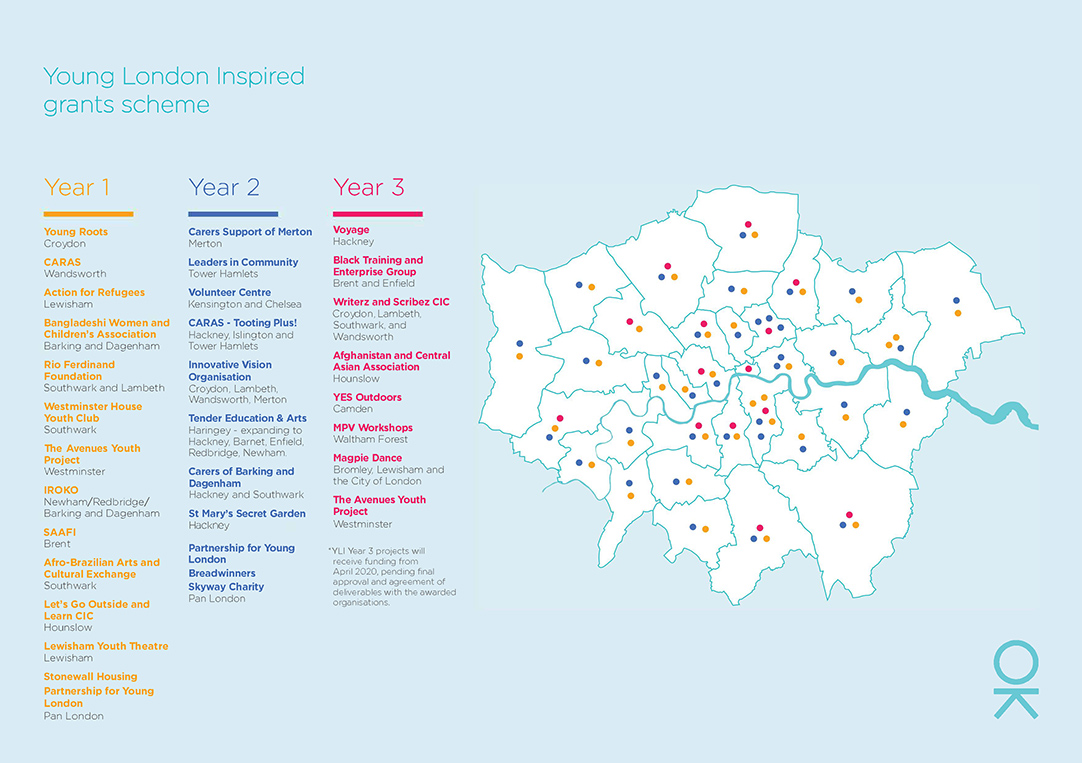
Youth Mental Health First Aid
Thrive LDN has received funding from the Mayor’s Young Londoners fund to roll out Youth Mental Health First Aid (MHFA) as part of a three-year commitment to improve the mental health and wellbeing of children and young people in London.
The programme’s aim is to ensure that all state funded primary, secondary, special educational needs schools, sixth forms and further education colleges within London have access to a Youth Mental Health First Aider by March 2021.
Evidence suggests that the earlier a mental health issue is identified and treated, the quicker and more positive the recovery process is likely to be.[15] Schools have a significant role in the prevention of poor mental health and promotion of wellbeing.[16]
What has been implemented?
State funded schools and colleges within London have been offered two-day youth MHFA training. This was carried out with the support of local authority partners who promoted this training to schools and colleges.
What has changed as a result?
As part of the programme in partnership with Mental Health First Aid England:
- The programme has delivered training in every London borough.
- 101 new Youth MHFA Instructors were trained during 2018/19, doubling the number of instructors in London and the South East.
- 1,300 education staff have been trained London-wide so far.
What has been the outcome?
A citywide evaluation by University College London is underway to assess the impact of the training on schools, pupils and teachers.
Findings from the national evaluation of the one-day youth MHFA training in schools and colleges found that:[17]
- After training, staff reported a threefold increase (190%) in confidence in the knowledge, skills, and awareness to support a young person struggling with their mental health.
- 30% of education staff stated that they had the confidence, skills, and awareness to support a young person through mental distress.
- This increased to 59% post-training
- This demonstrated a further increase in confidence to 87% post-training, showing that confidence improved with practice.
- Youth MHFA Champions reported an increased ability to challenge mental health stigma and discrimination in their schools, raising whole school awareness of mental health issues.
What is the expected benefit?
Youth MHFA provides education staff with the knowledge, skills and confidence to identify and assist young people experiencing poor mental health. In doing so, it is anticipated to support young Londoners’ wellbeing and stop a mental health issue from getting worse.
![]()
Figure 11: Youth MHFA Instructor feedback and outcomes
Thrive LDN met and interviewed three Youth MHFA Instructors who were taking the course with a cohort in Redbridge. Here are some of their comments and reflections on the course and its value in supporting young people:
“It’s been such a great experience and it’s just made me more keen and passionate to help young people in our society… I think it’s so important that we have more of these programmes available to people and professionals. We need to help the young people of today because they’re going to be our future adults.”
“The experience has been really positive. The practical skills that we’ve learned have been particularly useful. Meeting the rest of the instructors in training, getting experience from them, developing our skills alongside them, has been invaluable.”
“It’s been absolutely fantastic. I’ve learned so many things. You have that one-to-one interaction, giving you strategies to improve that I hadn’t had before. I’m a firm believer in just putting as much resource [as possible] into supporting young people so they can become healthy adults.”
“I’ve delivered a two-day training last week and time and again delegates share their stories with me afterwards. I’m just saying all that to say the sessions are having a positive impact not just professionally, but people are benefiting personally and planning to make adjustments in their private, family lives.”
School staff also commented:
“Thank you. It should be part of teacher training.”
“This was the most useful course I have been to for years. All relevant and useful.”
![]()
Discover Storytelling
To encourage early conversations about mental health and to build resilience from a young age, Thrive LDN has an established partnership with Discover Children’s Story Centre and Bloomsbury Publishing to deliver immersive storytelling sessions for young children aged 4-7 year olds and their parents/carers. Positive parenting is a strong protective factor for mental health in childhood and later life.[18],[19]
What has been implemented?
The immersive storytelling sessions revolve around the picture books Perfectly Norman and Ruby’s Worry by Tom Percival. The event involves a performance followed by an arts and craft session for children to complete with their parents or carers.
Discover Story Centre delivered Perfectly Norman 12 times across London between 2018 and 2019. Sessions delivered with children and parents also included a resource that:
- Highlights a range of related titles that can be used for further discussion
- Suggests simple ways to explore mental health further
- Signposts towards relevant services, information and support
What has been the outcome?
Comments from parents and carers included:
- “Positive interaction, good learning skills for the children and adults.”
- “Nice way to show the children how to talk about their feelings and emotions.”
- “It is a great idea to find alternative ways to talk about your worries and feelings.”
- “I think it was a great idea. It explained feelings and emotions in a simple way.”
What is the expected benefit?
Discover Storytelling gives parents the opportunity to talk about mental health and individuality to their children from an early age.
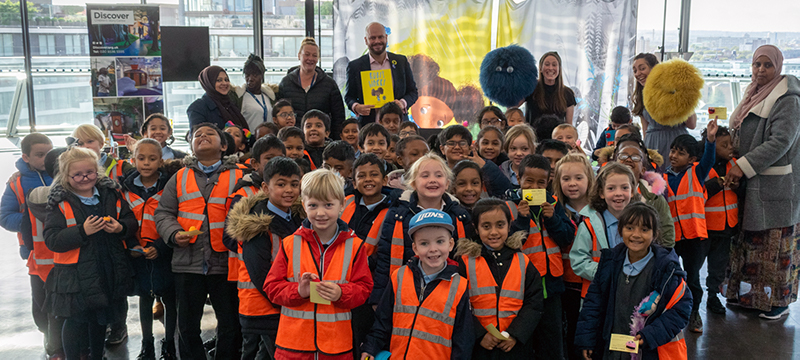
Thrive LDN Champions Network
We believe that empowering individuals and communities affected by inequality and mental health is key to creating sustainable change and addressing stigma and discrimination in London. Since launching in 2017, we have been convening an informal network of Londoners who are passionate about improving mental health and wellbeing.
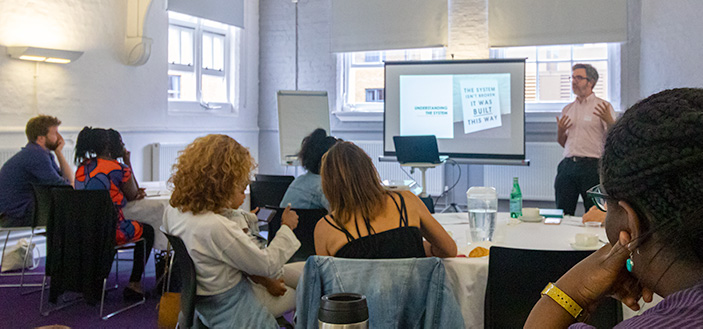
In 2019, Thrive LDN launched a Leadership Development Programme to support Champions to lead change locally. The programme and areas of training were developed by Champions and delivered in partnership with Sheila McKechnie Foundation (SMK).
What has been implemented?
Between May and November 2019, a cohort of more than 40 Thrive LDN Champions were enrolled in a Leadership Development Programme, which took place via two intensive residential days and a series of seven masterclasses, followed by a final learning event.
What changed as a result?
- Champions have collaborated on their own events at a local level and concepts for citywide campaigns.
- Individually and collectively, the Champions have become increasingly visible in Thrive LDN’s work.
What has been the outcome?
The programme has been evaluated by an independent consultant to establish its benefits and impacts, and to inform future training and development offers.
- Champions have reported increased confidence.
- Champions’ participation with Thrive LDN has increased.
- The number of locally owned and led Thrive LDN projects has increased.
- The Thrive LDN Champions Network has grown to include participation from across all London Sustainability and Transformation Partnership (STP) areas.
What is the expected benefit?
This programme and the learning from it will ensure that more change is led locally and sustainably to address inequality and improve the mental health and wellbeing of Londoners.
Right to Thrive
Through co-produced outreach and engagement, we aim to improve opportunities across London by raising the profile of individuals and communities who experience intersectional discrimination and disadvantage.
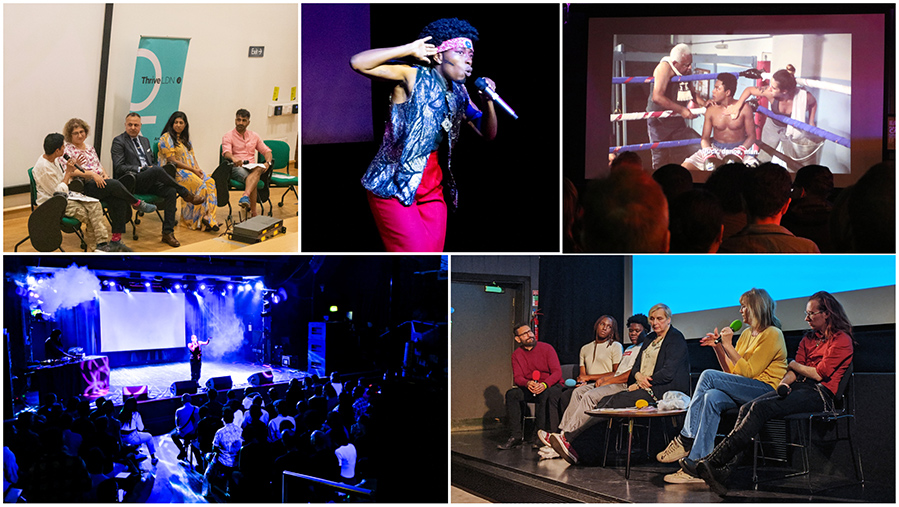
Thrive LDN and partners view diversity as not just an added extra, but one of our most valuable assets of our city. However, evidence and insights gathered from Londoners has shown that huge variation exist in terms of both experiences and outcomes, depending on who you are.
London is home to more than a million European Union citizens and more than 40% of Londoners identify as belonging to Asian, Black Mixed or Other ethnic groups. London also has a vibrant lesbian, gay, bisexual, transgender and queer (LGBTQ+) community. It is a global city where people from different countries, cultures and classes live together, side-by-side.
Intersectionality is the idea that people experience discrimination differently depending on their overlapping identities.
In other words, individuals and communities with multiple backgrounds, particularly minority groups, are more likely to experience exclusion, discrimination and bias.
Right to Thrive is an ongoing commitment to celebrate and protect diversity in London, especially for those at higher risk of unfair treatment based on their identity, beliefs or social class.
This year, efforts have focused on marginalised and intersectional communities who are especially susceptible to prejudice in London: Black LGBTQ+, Asian LGBTQ+, the Latin community, Gypsy, Roma and Traveller community, refugees and asylum seekers, black men, and transgender people.
Taking a person-centred approach
Commencing in 2018, Thrive LDN partnered with the research agency Revealing Reality to undertake a study exploring the lives of a diverse group of more than 150 Londoners.
The research took a person-centred approach, enabling people to tell their own stories in their own words. The resulting report Keeping Londoners Well (2019) highlights the role that stigma and discrimination may have in contributing to negative life experiences and puts forward a community-based approach to addressing this.
Building from this report, in 2019 Thrive LDN partnered with Brixton Reel and their community partners for the second year to explore and celebrate experiences and wellbeing with several diverse communities.
What has been implemented?
In 2019, Thrive LDN supported the growth and sustainability of Brixton Reel Film Festival, which aims to improve the mental health and wellbeing of marginalised London communities through film-based outreach projects.
As part of Thrive LDN’s commitment to consider intersectionality and support marginalised communities, Brixton Reel worked with partners and individuals from the Black LGBTQ+, Asian LGBTQ+, Latino LGBTQ+ and transgender communities to understand what wellbeing means to them and provide support and engagement appropriate to their needs.
What has changed as a result?
From April to November 2019, Brixton Reel carried out film-based outreach and co-produced a series of events on intersectional experiences and wellbeing, including:
- Too Desi Too Queer – an event celebrating Asian LGBTQ+ with short films and a panel debate.
- Too Black Too Queer – a one-night extravaganza celebrating Black LGBTQ+ experience and wellbeing.
- Demasiado Latinx, Demasiado Cuir/ Too Latino Too Queer – a one-night extravaganza celebrating Latin LGBTQ+ experience and wellbeing.
- A Journey Less Ordinary – an afternoon of short films, poetry and discussions exploring transgender experience and wellbeing.
What has been the outcome?
As a result of authentic partnership working, more than 1,200 people participated in the film-based outreach and events from intersectional and marginalised communities. Brixton Reel worked with 14 organisations. Working with these trusted partners generated ideas, developed and promoted content, and informed engagement activity to reach a wider audience of often overlooked groups (Figure 12).
- 75% of people who attend Too Desi Too Queer thought the event increased their understanding of what promotes positive mental health or wellbeing.
- 90% of people who attended Brixton Reel events thought the event increased their understanding of what promote mental health or wellbeing.
- 100% of people who attended A Journey Less Ordinary thought it was a good opportunity to meet and hear from other people from (and allies of) the transgender community.
![]()
Figure 12: Brixton Reel event feedback
“The range and diversity of voices involved in the event was excellent.”
(A Journey Less Ordinary)
“The films that were showcased were incredible, especially in a space where everyone is free to be themselves”
(Too Black Too Queer)
“It is so rare to attend a free queer person of colour (QPOC) event, full of art, energy and fun”
(Too Black Too Queer)
“Tonight was a great way to bring the community together”
(Too Latino Too Queer)
![]()
What is the expected benefit?
The objective of Right to Thrive is to improve Londoners’ opportunity to good mental health and wellbeing, by focusing on individuals and communities who need it most.
This co-produced and engaging methodology celebrates and strengthens social networks and amplifies voices of those often most isolated and at highest risk of discrimination.
Suicide Prevention
In 2018, 661 Londoners took their own lives; around 12 people every week <a href=”#_ftn20″ name=”_ftnref20″>[20]</a>. Although London’s suicide rate is the lowest in England, it varies significantly across the capital. People in particular groups are at higher risk of suicide, including: young people who may have been in care; people who have been the victims of sexual or physical violence; and LGBT+ communities. Social and economic factors also have an impact.
Suicide is a major issue for society and a leading cause of avoidable death in London. We do however know that suicides are not inevitable. There are many ways in which services, communities, individuals and society as a whole can help to prevent suicides and support those bereaved or affected by suicide.
We believe partnership working is paramount to creating meaningful change. Within suicide prevention, Thrive LDN particularly considers partnership working key in areas such as the data collection of suicides across London to inform methods of prevention.
Thrive LDN Suicide Prevention Group
One of the benefits of Thrive LDN being a collective enterprise is being able to bring different parts of London society together to disseminate individual learning and take a collective response and create change.
In 2017, there was recognition that a multi-agency group was needed to develop citywide suicide prevention actions.
The Thrive LDN Suicide Prevention Group was formed, and as of 2019 is composed of 36 organisations and 48 members including: London’s first responder authorities, NHS bodies, Public Health England, organisations associated with London’s rivers and railways, local authorities, academics, third sector organisations and those with lived experience.
The partnerships the Group has developed, and the participation of organisations and individuals from different sectors, has greatly enabled partnership working in this area.
The view from the Group’s co-chairs
“The opportunity to work with dedicated and passionate partners from all sectors to reduce the risk of suicide in the capital is a privilege that is inspiring and humbling. The size of the task is daunting, but the potential is enormous, as one death is one too many. What an amazing team who have pitched in to make a difference.”
Dr Phil Moore, Co-Chair Thrive LDN Suicide Prevention Group
“I feel honoured to be a part of this exemplary endeavour to address the tragedy of deaths by suicide. The coming together of dedicated charities, organisations and individuals affected by this travesty has created an effective group with a clear vision and direction. As a parent of a child lost to suicide, I hope that we as a group will soon be able to able to say that London is a caring city and every vulnerable Londoner has access to effective and timely help as and when they need it.”
Dr Sangeeta Mahajan, Co-Chair Thrive LDN Suicide Prevention Group
Thrive LDN Suicide Prevention Information Sharing Hub
Thrive LDN, with the help of external partners, has developed the UK’s first timely, multi-agency Suicide Prevention Information Sharing Hub (the Hub), allowing vital information to be securely shared across agencies.
What has changed as a result?
The Hub was developed for London agencies to increase understanding of the reasons why people have taken their own lives and the journey people make before taking their own life. It will also increase the availability of and reduce inconsistency in bereavement support for Londoners bereaved by suicide.
What has been the outcome?
As a result of the project there is now an online database hosted by the Metropolitan Police Service (MPS), with key stakeholders sharing their own information of a suspected suicide.
The database is available to all agencies involved in suicide prevention in London, with the expectation that they will adhere to the guidelines set out in the data sharing agreement (DSA).
What is the expected benefit?
Developing and implementing a Suicide Prevention Information Sharing Hub for the whole of London will assist the formation of prevention strategies, increase understanding and knowledge for agencies involved in this sensitive subject area and improve the consistency of bereavement support for those affected by suicide to prevent further suicide.
Thrive LDN will conduct a review at the end of the pilot phase (April 2020) by liaising with all stakeholders to gain feedback and understanding around which functions were beneficial and which aspects of the Hub which can be adapted or simplified.
Suicide Prevention Education
We’re very proud to announce our partnership with @PAPYRUS_tweets Prevention of Young Suicide to deliver #suicideprevention training across the education sector in London#mentalhealth #training #OKLDN
Read more here: https://t.co/Ib8QwekPow pic.twitter.com/7KWYHQwOQQ— Thrive LDN (@ThriveLDN) February 25, 2019
Thrive LDN has commissioned PAPYRUS UK to deliver suicide prevention education classes to all London boroughs. This is a two-year project to increase the awareness of suicide in school, colleges and higher education settings.
What has changed as a result?
London boroughs can access three different training packages:
- Ninety-minute suicide awareness sessions for schools, colleges and universities staff. This session aims to increase knowledge of the facts and contributing factors around suicide, as well as information about PAPYRUS and HOPELINEUK.
- A half-day Identifying and Talking about Suicide course which aims to improve suicide alertness amongst staff, teaching them how to identify a person at risk and respond effectively to aid safety.
- Two-day Applied Suicide Intervention Skills Training (ASIST). ASIST is an internationally recognised skills building workshop that prepares participants fully to provide effective and appropriate suicide first aid interventions.
What has been the outcome?
The phased rollout of PAPYRUS training across London is currently taking place. Schools, colleges and universities from across all London boroughs will have accessed PAPYRUS training by March 2021. The phased rollout of PAPYRUS training across London is currently taking place, with currently 4 of 5 STP areas accessing training. Schools, colleges and universities from across all London boroughs and STPs will have accessed Papyrus training by March 2021.
What is the expected benefit?
The education programme intends to further educators’ understanding of suicide and increase confidence to prevent suicide taking place in their school. It also aims to improve the suicide prevention strategies in place at all education sites as well as ensure that the conversation about suicide prevention and awareness is easy to initiate for all staff and pupils.
![]()
Figure 13: Participant feedback provided by Papyrus UK
- “Well-presented course that gave me much to think about – even the terminology”
- “The opportunity to have interesting and important conversations in a safe environment.”
- “Well worth attending, extremely eye-opening, well facilitated, thought provoking small group exercises. Much appreciated.”
- “Really useful to have clear concise information and open discussions on this sensitive topic but highly important one.”
- “Made me want to learn more.”
![]()
#ZeroSuicideLDN campaign
In an event marking World Suicide Prevention Day (WSPD) 2019 on Tuesday, 10 September, the Mayor of London outlined to leaders across London’s public, private and charitable sectors his ambitions to break the stigma of talking about suicide, suicidal thoughts and suicide bereavement.
Launching the #ZeroSuicideLDN campaign in partnership with Thrive LDN and the Zero Suicide Alliance, the Mayor encouraged 100,000 Londoners to take free, online suicide prevention training by WSPD 2020.
What has changed as a result?
The campaign is managed as part of Thrive LDN’s on-going suicide prevention work. It is supported by the Mayor of London and other partners, including the NHS in London, London Councils, London’s police forces, Transport for London, and other emergency services, such as London Fire Brigade and the Maritime and Coastguard Agency, alongside voluntary and community groups.
What has been the outcome?
- As of December 2019, more than 35,000 Londoners have completed the suicide prevention training
- More partners have pledged to incorporate the Zero Suicide Alliance training as part of their workforce’s training packages
What is the expected benefit?
The campaign is enabling Londoners to receive free, quick and practical training on suicide prevention, with the ultimate aim of reducing suicides across the capital and beyond. It will support the aspiration for London to become a ‘zero suicide city’.
Our future activities and initiatives
As well as activities that run continuously, Thrive LDN has several activities and initiatives due to launch between January and March 2020. A brief summary is presented below. An updated report will be published in March 2020 which will include insights and feedback from these activities and initiatives.
Londoners did
In December 2018, we published Londoners said – a report summarising the findings of the 17 community conversations we held in partnership with the Mental Health Foundation, covering half of London’s boroughs and attended by more than 1,000 Londoners.
In early 2020, we will publish an independent follow up report – with the working title Londoners did – demonstrating the outcomes from the extensive community engagement project and lessons for future community engagement activities.
How do we #ThriveLDN? campaign
In partnership with local authorities across London, we are gearing up for the next phase of our campaign to explore and celebrate what Londoners are doing in their communities to build strength and resilience by asking: How do we #ThriveLDN?
The campaign, launching in 2020, continues Thrive LDN’s citywide, open conversation to encourage everyone to think, talk and act more when it comes to mental wellbeing for them and their communities. Many communities across London are doing amazing work and the campaign will recognise that with challenges and barriers comes aspiration, passion and huge, important contributions to London.
Engaging more with London’s black communities
Thrive LDN has a strong working relationship with Black Thrive and we are currently planning a collaboration for 2020 that would focus on engaging black communities across London, with a particular focus on young black men.
The aim of the collaboration is to bring black men in the community closer together, explore topics around mental health and wellbeing and help grow local and regional networks.
Act On: podcast series
In partnership with Voluntary Arts and BBC Radio London, we have been training a group of young Londoners to develop and record podcasts. In early 2020, we will launch the ‘Act On:’ podcast series to open up conversations on important topics for young Londoners, including:
- Act On: Inequality
- Act On: Social media
- Act On: Young male suicide
- Act On: Music
- Act On: Sport
- Act On: Culture and participation
Expansion of Youth Mental Health First Aid
Due to the success of the programme in its first year, Thrive LDN has been awarded further funding from the Mayor’s Young Londoners to expand the coverage of training to include youth clubs, charities working with young Londoners and universities.
The expansion of the programme will increase the number of trained Youth Mental Health First Aiders working with young people across London and further ensure that young Londoners can get the timely support they need when experiencing mental health issues – both in and out of the classroom.
Right to Thrive grants scheme
Right to Thrive is an initiative to better understand how discrimination – based on the intersection of characteristics such as race, beliefs and identity – effect individual’s mental wellbeing.
In addition to the research and community engagement detailed in Section 3, we are launching a new two-year grants scheme for voluntary organisations and community groups to develop more community-led and peer-led initiatives. The grants scheme intends to:
- Increase awareness of challenges facing Londoners from intersectional and marginalised communities
- Increase activity to address challenges facing Londoners from intersectional and marginalised communities
- Improve mental health and wellbeing of grant recipients and participants
Discover Storytelling
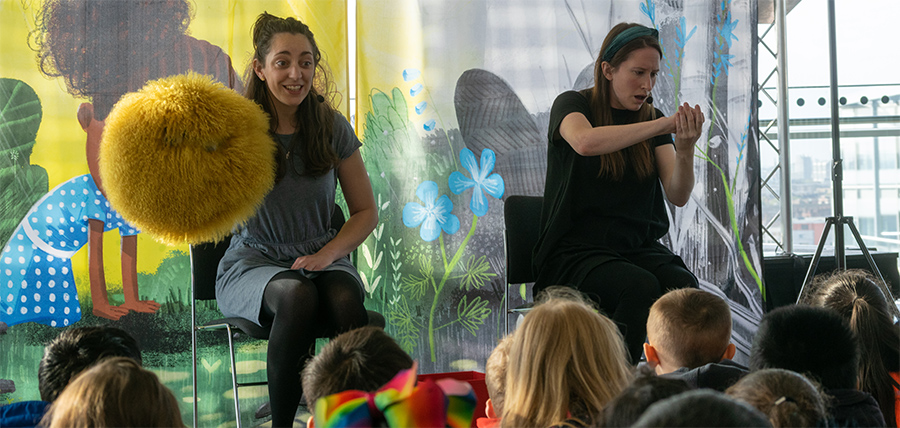
As highlighted in Section 3, Thrive LDN has an established partnership with Discover Children’s Story Centre and Bloomsbury Publishing to deliver immersive storytelling sessions for young children aged 4-7 year olds and their parents or carers to encourage early conversations about mental health and to build resilience from a young age.
To scale up the project, in early 2020 we are planning to make use of digital tools and technology to facilitate a live broadcast of a performance which can be accessed for free by all primary schools in London.
How do we #ThriveLDN for the long-term?
Thrive LDN has seen rapid growth since our public launch in 2017, becoming a complex collection of partnerships, projects and activities.
Whilst there have been numerous successes, there is still much more for us to learn and achieve, and we have begun to think about how best Thrive LDN can ensure all Londoners have an equal opportunity to good mental health over the next five years.
For all our activities and initiatives, this will involve us continuing with the same core approach. The successes so far have been the result of:
- Recognising participation as the driving force of Thrive LDN;
- Understanding that partnerships are the firm foundations from which we can build sustained collective action; and
- Valuing and developing diverse leadership that operates in different ways.
Whilst any future strategy will need to be agile and responsive to how the policy landscape, nationally and regionally, changes over the next five years, it will also need to continue to value our history, stay true to our core approach and continue to scale them up across London.
Valuing our history
Throughout the history of Thrive LDN, we have continuously worked with partners to engage with Londoners to better understand more about their experiences, the challenges they face and identify ways we could work together. For example:
- Thrive LDN: towards happier healthier lives
- The opportunities for arts and cultural activities to improve the mental health and wellbeing of Londoners
- Londoners said
- What Londoners with lived experience said
- Ensuring all Londoners have an equal opportunity to good mental health
- Keeping Londoners Well
Whilst it is important for us to recognise diversity and difference across publications, what emerged were some common themes (Figure 14).
Figure 14: Common themes from participants
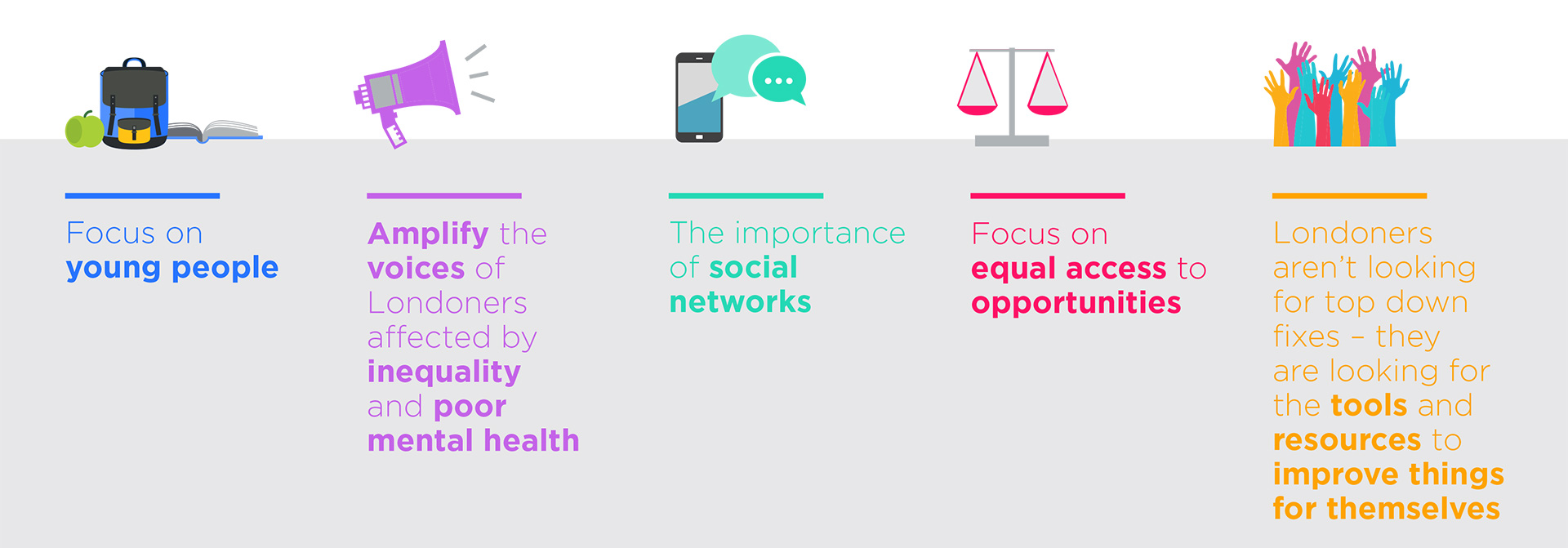
What might our approach to participation look like?
We know that Londoners need to be motivated, able and prompted to act.[21] The challenge over the next five years will be how we continue to utilise the networks we have and reach out to the wider population to scale participation – moving from hundreds of thousands to millions – whilst continuing to add depth to ensure we don’t lose our focus on working with intersectional and marginalised communities in London.
What might our approach to partnerships look like?
Thrive LDN’s engagement with Londoners played a pivotal role in informing London Health Board partners’ Health and Care Vision for London (2019) which sets out how partners plan to support and build upon significant collaborative work already taking place across London.
Elsewhere in London, there are many other programmes and partnerships underway to improve the health and happiness of Londoners. For example, Fast Track Cities London; London’s Child Obesity Taskforce; and Good Thinking.
There will be opportunities over the next few years to work more closely with these and others, including internationally with Cities Thrive, to identify opportunities to work together and maximise impact.
Furthermore, Thrive LDN has benefited from working closely with colleagues from the Mental Health Policy Research Unit and the Centre for Society and Mental Health, and there will be significant opportunities over the next five years to support wider academic collaboration.
More broadly, there will be opportunities to continue to dissolve traditional boundaries to develop multidisciplinary, cross-sector partnerships to mobilise collective responses to common challenges, such as with the Violence Reduction Unit.
What might our approach to leadership look like?
Thrive LDN will continue to need ongoing support from the Mayor of London and London Health Board partners to succeed. More broadly, Thrive LDN will need to continue to value and develop diverse leadership at different levels, and develop new ways to share power and resources across the city before we will authentically be able to say that Thrive LDN is led by Londoners.
In conclusion
As a movement, the best way for us to determine how Thrive LDN can ensure all Londoners have an equal opportunity to good mental health over the next five years, is to not dictate here what we think Thrive LDN’s priorities should be. Instead, we need to remain open and invite participants and partners to help us determine our future strategic direction.
Between January and March 2020, through a citywide campaign, focus groups and direct engagement with Londoners, we will do just that, asking: how do we thrive London?
Get involved
You can get involved and join the conversation now:
- Across all social media channels using: #ThriveLDN or @ThriveLDN
- Send us an email to: info@thriveldn.co.uk.
- Write to us at: Thrive LDN, Greater London Authority, City Hall, The Queen’s Walk, London, SE1 2AA.
Appendix 1 – Thrive LDN evaluation framework
By presenting the methods and processes used by Thrive LDN, this Appendix represents a developing framework on how Thrive LDN approaches delivering activities, interventions and events, as well as finding opportunities to collect insights and analyse.
An understanding of how programmes and activities function, effectiveness of outputs, outcomes and longer-term impact – is essential to inform internal strategic decision-making for Thrive LDN, partners and participants and externally to inform and influence the wider system.
Evaluation is a demonstration of accountability; Thrive LDN shares evaluation findings as part of our accountability to participants, partners and funders. Thrive LDN is constantly building on an evaluation framework to fully understand what is working well, and what is working less well, to enable all activities to systematically, continuously improve.
Current practice uses elements of process evaluation to look at how activities are delivered and impact evaluation to look at the difference made. Going forward, working with academic partners from The Centre for Society & Mental Health at King’s College London and the NIHR Mental Health Policy Research Unit, Thrive LDN will build on this evaluation framework, ensuring resource is proportionate to the novelty and cost of the programme of activity and individuals.
Standardised monitoring takes place across all Thrive LDN activities, to determine as systematically and objectively as possible the reach and depth of participation in the light of their objectives.
This involves data collection of participant demographics and qualitative feedback on the perception of quality, effectiveness and increase in understanding of what promotes good mental health and wellbeing. Self-reported questionnaires were completed in-hand or online depending on the type and scale of activity. Consent to share contact information with Thrive LDN and evaluation partners is collected as standard to enable follow up evaluation.
References
[1] Mental Health Foundation (2009). Mental health, resilience and inequalities: A commentary by Mental Health Foundation
https://www.mentalhealth.org.uk/sites/default/files/mental_health_resilience_inequalities_summary.pdf
[2] Public Health England (2019) Wider determinants of health
https://fingertips.phe.org.uk/profile/wider-determinants
[3] Trust of London, London Poverty Profile (2017)
https://www.trustforlondon.org.uk/data/poverty-over-time/
[4] WHO, & Calouste Gulbenkian Foundation. (2014). Social determinants of mental health. WHO Geneva.
who.int/social_determinants/sdh_definition/en/
[5] Child Poverty Action Group. Child Poverty in London: Key facts. (2019)
http://www.cpag.org.uk/campaigns/child-poverty-london/keyfacts
[6] Qassem, T., Bebbington, P., Spiers, N., McManus, S., Jenkins, R., & Dean, S. (2015). Prevalence of psychosis in black ethnic minorities in Britain: Analysis based on three national surveys. Social Psychiatry and Psychiatric Epidemiology, 50(7), 1057–1064. https://www.ncbi.nlm.nih.gov/pubmed/25208909
[7] Semlyen, J., King, M., Varney, J. and Hagger-Johnson, G. (2016). Sexual orientation and symptoms of common mental disorder or low wellbeing: combined meta-analysis of 12 UK population health surveys. BMC psychiatry, 16(1), p.67.
https://bmcpsychiatry.biomedcentral.com/articles/10.1186/s12888-016-0767-z
[8] Timms, H. & Heimans, J. (2018) New Power: How Power Works in Our Hyperconnected World – and How to Make IT Work for You
[9] Public Health England (2019) Wider determinants of health
https://fingertips.phe.org.uk/profile/wider-determinants
[10] Bharmal et al (2019) Understanding the Upstream Social Determinants of Health Rand Health
https://www.rand.org/content/dam/rand/pubs/working_papers/WR1000/WR1096/RAND_WR1096.pdf
[11] BJ Fogg (2018) BJ Foggs’s Behavior Model
www.behaviormodel.org
[12] Greater London Authority (2019) Survey of Londoners
http://tiny.cc/px9fhz
[13] Sadler, K et al., (2018) Mental Health of Children and Young People in England, 2017
https://bit.ly/2OUhSx4
[14] Team London Internal Evaluation Report (2019) Greater London Authority.
[15] McGorry PD, Mei C. (2018) Early intervention in youth mental health: progress and future directions. Evidence-Based Mental Health; 21:182-184.
[16] Department for Education (2018) Mental health and behaviour in schools
https://bit.ly/34XzUEf.
[17] Robert-Holmes, G., Mayer, S., Jones, P., and Lee S.F. (2018) An Evaluation of Phase One of the Youth Mental Health First Aid (MHFA) in Schools programme: “The training has given us a vocabulary to use.”
https://bit.ly/388Y68J
[18] Donkin, A., (2014). Good quality parenting programmes and the home to school transition. Institute of Health Equity, London.
[19] Fryers, T., and Brugha, T., (2013) Childhood Determinants of Adult Psychiatric Disorder. Clinical Practice & Epidemiology in Mental Health, 9, 1-50.
[20] Office for National Statistics (2019) Suicides in the UK: 2018 registrations
https://www.gov.uk/government/statistics/suicides-in-the-uk-2018-registrations
[21] BJ Fogg (2018) BJ Foggs’s Behavior Model
www.behaviormodel.org
